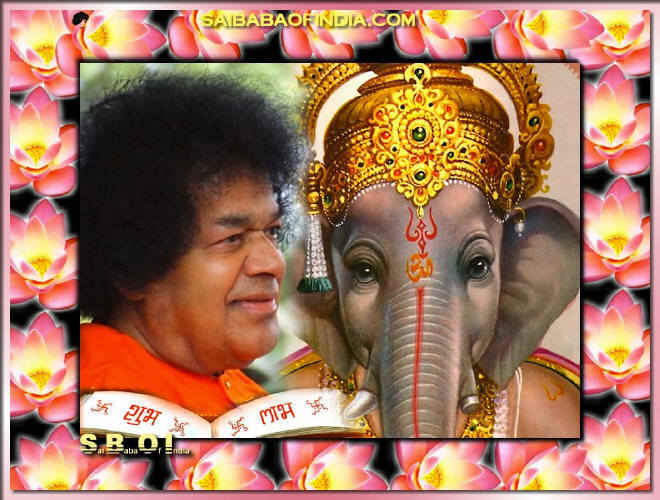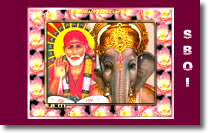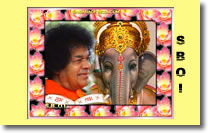Vinayaka or Ganesh or Ganapathi or Vighneswara all indicate the
Elephant-God, who is popular among young and old, and who is worshipped as the very
first deity, before regularly beginning any ceremony or samskar, any yaga of yajna,
any vow or fast or pilgrimage. He is the Lord of the ganas or divine forces, inside
and outside the human body; He is the Lord, who masters and overwhelms vighna or
obstacle, however imminent or eminent. This is the natural effect of the fact that
Ganapathi is the God of Intelligence, vidya or buddhi.
Another name for Vinayaka is 'Vighneswara'. Easwara is one who is endowed with every
conceivable form of wealth: riches, knowledge, health, bliss, beauty, etc.
Vighneswara is the promoter of all these forms of wealth and removes all obstacles
to their enjoyment. He confers all these forms of wealth on those who worship him.
Vinayaka is described as "Prathama Vandana" (the first deity who should be
worshiped). As everyone in the world desires wealth and prosperity, everyone offers
the first place for worship to Vighneswara.
Ganapathi is a God revered in Tantric lore, and also, by various Vedic mantras. The
elephant is proverbially the most intelligent among the mammals and it is
vegetarian, indicating its sathwic nature. Ganapathi has the head of the elephant,
for, it indicates the Intelligence through which obstacles in the path of
achievement, secular as well as spiritual can be overcome. There is a popular verse,
used on most occasions when Ganapathi is invoked. It mentions various attributes of
this God: Suklambaradharam (wearing white vesture) is the first. This is the symbol
of purity, for, ambara means also the sky (space, ether), the akasa of the heart.
Ganapathi is pure, having universal love and compassion. Vishnu is the second
attribute, ascribed to Him.
Vishnu means that He is present everywhere, at all times. Sasivarnam is the third
adjective used. Of the complexion of ash, or Vibhuti, that is to say, glowing with
spiritual splendor, with the majesty of spiritual attainments, achievements and
potentialities. These are also called Vibhutis, for, in the Gîtâ, we find Krishna
saying, 'wherever you see Power, Glory, Majesty (Vibhuti), know that it is Mine'!
Ganesha is bathed in His Divine Glory; that is the significance of the attribute
Sasivarnam.
Chathurbhuja (four-handed) is the next fourth denotation. This means that apart from
the two visible hands, He has two invisible hands, that are available for the two
divine uses of:
1. Blessing the devotee and
2. Guarding him from danger.
The last fifth of the descriptive word is Prasannavadanam (of bright countenance).
The countenance depicts the inner calm, happiness and balance, inner grace and
mercy, the consciousness of strength and sovereignty.
What is the esoteric meaning of Ganesha's elephant head? The elephant is noted for
its acute intelligence. Ganesha's elephant head symbolizes sharpness of intellect
and the highest power of discrimination. Because of the purity of his intellect,
Vinayaka is also called the giver of buddhi (intellect). He responds to the prayers
of devotees and hence is known as Siddhi Vinayaka (the Vinayaka who grants what is
sought).
In a forest, when an elephant moves through the jungle, it clears the way for others
to follow. Likewise, by invoking Ganesha, the path is cleared for our undertakings.
The elephant's foot is so large that when it moves it can stamp out the footprints
of any other animal. Here, again, the symbolic meaning is that all obstacles in the
way will be removed when Ganesha is accorded the place of honor. The journey of life
is made smoother and happier by the grace of Ganesha.
Vighneswara is also regarded as one endowed with the wisdom of the elephant. The
elephant is noted for its supreme intelligence. it is also known for its absolute
loyalty to its master. The direct proof of this is Sai Githa (Bhagavan's elephant).
Ordinarily hundreds of cars will be passing on the road. Sai Githa will take no
notice of them. But when Swami's car happens to pass that way, she will
instinctively notice it, She will rush to the road raising her familiar cry. What
love for Swami! It will be no exaggeration if faith is equated with the elephant.
When an elephant moves among the bushes, its path turns into a regular passage for
all animals. It is thus a pacesetter for all animals.
The mouse is Ganesha's vehicle. The mouse is a clever and lively creature. As a
symbol it means that we should be clever and diligent in our actions. The mouse also
symbolizes the darkness of the night. The mouse can see well in the dark. As
Vinayaka's vehicle the mouse signifies an object that leads man from darkness to
light. The Vinayaka principle thus means that which removes all the bad qualities,
bad practices and bad thoughts in men and inculcates good qualities, good conduct
and good thoughts.
Without intelligent discrimination, no skill or strength can be profitably used. One
must know how fire, for example, or the electric current has to be used and how far
one can deal with it as an instrument for our needs. The senses of man are also like
fire; they have to be kept under constant vigilance and control.
No worship can succeed unless the heart is pure and the senses are mastered. Ganesha
is the God who helps overcome obstacles; but, He will create obstacles when good
endeavor is obstructed by bad influences; He will clear the path for the sincere
sadhaka. He is Prasannavadanam (of bright countenance), of beneficial looks, when
you pray to Him for good ends; but, He will not be that when you seek His help for
nefarious stratagems! He is Pranava-Swarupa, the Om personified; so He is
auspiciousness itself.
Vinayaka is a leader for all deities. Faith in Vinayaka should be developed as the
exemplar for all deities and He should be worshiped as the embodiment of Divinity.
Ganesh Gayatri
Om Eka Dantaya Vidmahe
Vakra Thundaya Dhemahi
Thannoh Dhantih Prachodhayath
Om Shanti ... Shanti ... Shanti
Realizing that Elephant-faced One,
with one tusk is God;
Meditate on the One Who has a curved trunk;
May He enlighten our intellect.
|


